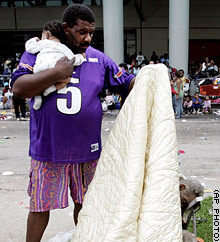
According to AP, this photo shows a man covering the body of a man who died — apparently in a chair — on Thursday outside the convention center in New Orleans. The baby in his arms looks to be about three or four months old. I wonder whether she has any milk to drink.
Plenty of people are “saying”:http://atrios.blogspot.com/2005_08_28_atrios_archive.html#112559511188392756 “this”:http://examinedlife.typepad.com/johnbelle/2005/09/this_is_not_goo.html “already”:http://www.washingtonmonthly.com/archives/individual/2005_09/007022.php, but the situation in New Orleans and the surrounding areas is just unbelievable, and the official response thus far is pretty appalling. The United States is the most powerful country on the face of the earth. Over the past few years in particular, a lot of money and thought was supposed to have been devoted to planning for rapid response to large-scale urban disasters in the wake of 9/11. While authorities in Louisiana and New Orleans are not as powerful as the Feds, they have known for years that a disaster of this kind was likely and were told in detail what it would do to their city. And yet. The “reports of what’s happening”:http://edition.cnn.com/2005/WEATHER/09/01/katrina.impact/index.html convey little except how “poorly-prepared”:http://www.realcities.com/mld/krwashington/12528233.htm, “ill-coordinated”:http://www.guardian.co.uk/worldlatest/story/0,1280,-5248531,00.html and “slow-moving”:http://delong.typepad.com/sdj/2005/09/impeach_george_.html the disaster response is. As “Mark Kleiman”:http://WWW.markarkleiman.com/archives/microeconomics_and_policy_analysis_/2005/08/failing_to_plan_is_planning_to_fail.php comments, failing to plan is planning to fail. Kevin Drum provides “a demoralizing chronology”:http://www.washingtonmonthly.com/archives/individual/2005_09/007023.php explaining why FEMA is being run by people with “no experience”:http://www.warandpiece.com/blogdirs/002458.html in disaster management.
Meanwhile, apparently the secretary of state has been “shoe-shopping on 5th avenue”:http://www.gawker.com/news/condoleezza-rice/index.php#breaking-condi-rice-spends-salary-on-shoes-123467.